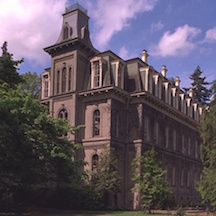 The University of Oregon has announced that it will not rename Deady Hall on its campus, despite the fact that the man for who the building was named, Matthew Deady a legislator, university regent, and federal judge, was a supporter of the institution of slavery. The renaming of the building was included in a set of 13 demands made by the Black Student Task Force in the fall of 2015.
The University of Oregon has announced that it will not rename Deady Hall on its campus, despite the fact that the man for who the building was named, Matthew Deady a legislator, university regent, and federal judge, was a supporter of the institution of slavery. The renaming of the building was included in a set of 13 demands made by the Black Student Task Force in the fall of 2015.
In a comprehensive letter to the university community, Michael Schill, president of the University Oregon acknowledged Deady’s racist views and called him “a deeply flawed man.” But he also listed Deady’s many contributions to the University of Oregon. President Schill explained his decision not to rename the building:
“The fact that Deady’s views and actions were shared by many Oregonians at the time he lived does not excuse them, although it does explain them. Contemporary decision-makers will often be limited in their ability to evaluate the behavior of people who lived in circumstances and with cultural mores very different from our own. Denaming is also an act associated with ignominy and the destruction of reputation. We should normally be careful when we do this, particularly because the person involved will seldom be available to defend himself or herself. Denaming threatens to obscure history and hide the ugliness of our past, which is contrary to our institution’s values of promoting lifelong learning and sharing knowledge. Therefore, the presumption should be against denaming a building except in extraordinarily egregious circumstances.”
President Schill also noted that “the fact that Deady Hall will remain a symbol of racial intolerance for many of our students is troubling. Many students associate this past and our continuing to honor a man who was racially intolerant as evidence that the university does not take their concerns about diversity and inclusion seriously. Nothing could be further from the truth.”
Recognizing that Black students may be disappointed by his decision, President Schill also announced his commitment to build a new Black Cultural Center at the University of Oregon. He stated that “African American students need a place that will provide them with an opportunity to gather, reinforce their academic pursuits, enhance connective bonds that support recruitment and retention, and discuss their shared experiences and needs.”
President Schill’s entire letter may be read here.

